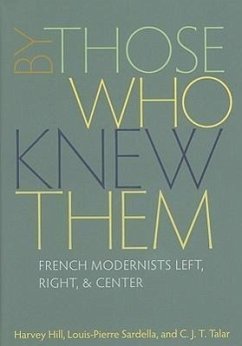By Those Who Knew Them illuminates the lives of several key figures involved in the modernist movement--the movement for intellectual and structural renewal in turn-of-the-century Catholicism. The historical reality of the movement is complex. On one hand, its members sought to bring the Church in its thought and life into a more positive relationship with the modern world. On the other hand, the participants did not always have the resources needed for the project, and some thinkers advocated positions that would have been corrosive of a transcendent faith. The portrait of Modernism given in Pius X's 1907 Pascendi both identified real problems and suggested an organization and coherence to the movement that it did not possess. In this impressively researched volume, the authors concentrate on French Modernists. Joseph Turmel and Marcel Hébert, on the left, accorded full authority to critical history and insisted that it discredited Catholic theology. Modernists of the right such as Pierre Batiffol believed in the possibility of reconciling history and theological orthodoxy without radical reformulation of teaching. Alfred Loisy and Archbishop Mignot, in the center, believed radical reformulation was necessary. The book extends beyond these subjects and encompasses their biographers and commentators, namely Félix Sartiaux, Albert Houtin, Jean Rivière, Henri Bremond, and Louis Lacger. Most of these biographers were themselves active participants in the Modernist movement and were networked among each other in interesting ways. The authors argue that the configuration of the lives of the figures prominent in the Modernist movement sheds light not only upon those participants and their biographers, but upon the perception of Modernism itself by those who were involved. ABOUT THE AUTHORS: Harvey Hill is associate professor in the department of theology and philosophy at Berry College and author of The Politics of Modernism: Alfred Loisy and the Scientific Study of Religion. Louis-Pierre Sardella is Inspecteur de l'Education nationale, Docteur en Histoire contemporaine, and author of Mgr Eudoxe Irénée Mignot (1842-1918). C. J. T. Talar is professor of systematic theology at the University of St. Thomas School of Theology at St. Mary's Seminary and author of (Re)reading, Reception, and Rhetoric: Approaches to Roman Catholic Modernism. PRAISE FOR THE BOOK: "By comparing and contrasting multiple biographical portraits of various "Modernists" written in the early twentieth century, the present volume reveals deep fissures and antipathies between thinkers whom the papacy had blithely subsumed beneath a generic category. . . . This superb collection will appeal not only to scholars of religion and modernity but more broadly to anyone interested in biographical monuments as contested sites of memory." -- Stephen Schloesser, American Historical Review "This fascinating and well-crafted little book should be of interest not only to scholars specializing in Roman Catholic modernist thought but also to educated readers generally who have an interest in church history and human psychology." -- Lawrence Barmann, Catholic Historical Review "[T]his is a valuable book. Though the book contains the writing of three authors, it coheres remarkably well, almost as if written by one. The chapters are easy to follow. They provide multiple perspectives on the personalities under discussion. Sufficient attention is given to the ideas of the historical figures to understand what was at stake in the controversies. We learn much."--Darrell Jodock, H-France Reviews
Hinweis: Dieser Artikel kann nur an eine deutsche Lieferadresse ausgeliefert werden.
Hinweis: Dieser Artikel kann nur an eine deutsche Lieferadresse ausgeliefert werden.








